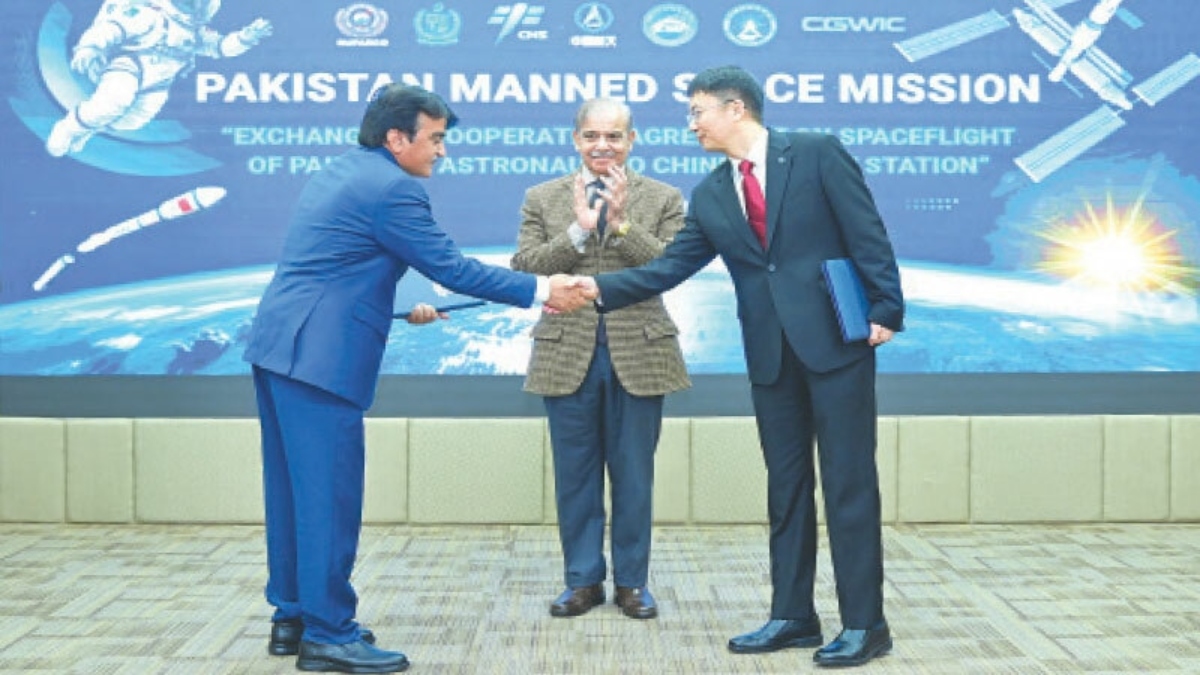On Thursday, Pakistan’s Space & Upper Atmosphere Research Commission ( SUPARCO ) announced an accord with China, which would facilitate Islamabad’s first manned mission to space. Suparco and the China Manned Space Agency (CMSA) signed a cooperation agreement in which Beijing agreed to train and send Pakistani astronauts to space.
As per the accord, two Pakistani astronauts will undergo training at the Astronaut Centre of China and will be sent to China’s space station, Dawn reported. While it is a big feat for Suparco, it also reflects a sad reality of the current condition of the body. The space agency, which started before both the Chinese space agency and Indian Space Research Organisation (ISRO), now has to piggyback on Beijing to achieve milestones in space.
According to Pakistani news outlet Dawn, one of the astronauts will be trained as a scientific payload specialist for specialised research aboard the China Space Station (CSS). The selection process for the two astronauts will be completed by 2026. While lauding the initiative, Prime Minister Shehbaz Sharif said that the agreement was “another wonderful gesture” from the Chinese government to further deepen bilateral cooperation in the field of space.
But here’s a look at how, in search of gold, Pakistan forgot to nourish a diamond, which they found in their own backyards.
The rise of Suparco
Pakistan owes a lot of its scientific achievements to the country’s first Nobel laureate, Prof. Abdus Salam. While speaking to Firstpost last year, Pakistani scientist and author Prof. Pervez Hoodbhoy emphasised that before Pakistan’s then-PM Zulfikar Ali Bhutto announced that Ahmadis would not be considered Muslims (affected Salam a lot since he was an Ahmadiyya), Salam was the “most important person in Pakistan” in regards to the development of science and technology in the country.
“Salam was an adviser to then-President Ayub Khan. He was responsible for setting up the Pakistan Space Program, Suparco. He was responsible for advising the government on getting a reactor from Canada and installing it in Karachi. In agricultural research and many different things, Pakistan couldn’t have found anybody better,” Prof. Hoodbhoy explained.
With his genius, Pakistan established SUPRARCO on 16 September 1961. The very next year, in June 1962, it launched Rahbar-1. The country, which was struggling with its economic woes, managed to achieve the feat years before Isro was established.
Impact Shorts
More ShortsSince then, the space agency has been responsible for several other projects like suborbital flights and sounding rockets, the Launch of Badr Satellites on July 16, 1990, and Remote Sensing and Earth Observation (PRSS-1) in 2018. However, several factors contributed to its downfall.
The downfall: Where did Suparco fail?
When asked this question to Prof. Hoodbhoy, he elucidated the factors that led to the downfall of the Pakistani space agency. “It was doing okay in the 1960s, and it was sending up the sounding rockets and learning the essentials of rockets, but then Pakistan didn’t have a sound, strong scientific base. Its education system, particularly where science is concerned, is weak. There is no culture of science in the country,” he said.
“To your question, I think it is the base in physics and mathematics which in the case of India and China are very strong and in the case of Pakistan are very weak. That accounts for the difference in the levels of performance of Suparco and Isro,” he added.
Another factor that contributed to the issue was the fact that Pakistan was more interested in developing its military technology rather than space technology. While India and Pakistan were racing to develop nuclear weapons, Pakistan’s then-PM Zulfikar Ali Bhutto said, “We (Pakistan) will eat grass, even go hungry, but we will get one of our own (atom bomb)… We have no other choice!” In his book titled “The Idea of Pakistan,” Stephen Cohen also mentioned that the Pakistani generals took leadership in Suparco, relegating the scientists to the side.
While India lauded and respected the contributions of India’s very own ‘Rocket Man,’ Vikram Sarabhai, Salam was relegated to the side because he was an Ahmadiyya. Salam loved his country, and Sarabhai loved his country, but only one country loved its scientists back. Imagine the kind of development Pakistan would have witnessed if Salam’s vision had been fully implemented.
Sadly, Pakistan still doesn’t have Indigenous satellite launching and producing technology and aims to build that by 2040. The current condition of the Pakistani space agency makes one realise how important it is for the country to keep investing in research and development, to rely on its scientists and support them in their endeavours. Development in space research can also help in solving day-to-day problems, be it in agriculture or telephonic conversation.
Pakistan’s over-reliance on China
With the downfall of Suparco, Pakistan heavily relies on China for its space program. For the past few years, Beijing has been launching satellites for Pakistan to help its ally. On May 30, 2024, China successfully deployed a communications satellite destined for Pakistan.
The satellite, named PakSat MM,1 is a versatile communication satellite which was launched atop a Long March 3 B rocket from the Xichang Satellite Launch Center in Southwest China’s Sichuan province.
Even to this day, Pakistan maintains a modest aspiration in space exploration. However, it substantially lags behind its competitors like ISRO, NASA, etc. While Pakistan has the vision to transition into a spacefaring nation by 2040, it still lacks a cohesive strategy to achieve that feat. Given Pakistan’s historical and current trajectory in space exploration, it seems their reliance on China is most likely to persist for the foreseeable future.
With inputs from agencies.


)

)
)
)
)
)
)
)
)



